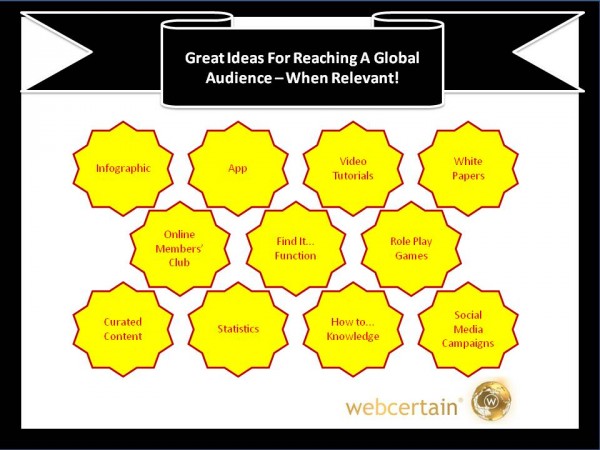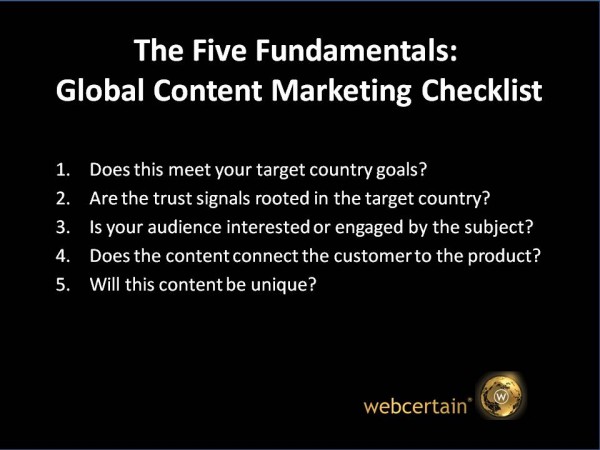Content Marketing: What Are The Implications When Working On A Global Scale?
As “online marketing” evolves, you’ll note I’ve used a generic term there rather than SEO — the titles and descriptions of what we do on a daily basis change as does the focus of the effort. Both “Panda” and “Penguin” in their different ways have had a dramatic influence on how important people think “content” […]
As “online marketing” evolves, you’ll note I’ve used a generic term there rather than SEO — the titles and descriptions of what we do on a daily basis change as does the focus of the effort. Both “Panda” and “Penguin” in their different ways have had a dramatic influence on how important people think “content” is.
That’s a huge revelation, of course. Never before had any of us figured out that the giving people access to rich information in the form of “content” could have any relevance whatsovever. (Don’t forget my British upbringing and look for the huge irony there, just in case you think I’m serious).
Become An Authority On Your Subject!
Some years ago, I founded a PR business with a partner — before search engines had been invented (actually, we didn’t even have email). In those olden days, when we old timers used to ride to work on horses (kidding), we used to call this “Become an authority on your subject”.
The idea was that you would submit relevant articles and “content” to the press who would publish the content for you. (This still works by the way!)

Great Ideas For Reaching A Global Audience – Providing They’re Relevant
One significant difference now, is that marketers are now also publishers and therefore have, theoretically, complete freedom to publish whatever they wish.
This has two advantages for the professional marketer:
- Many others abuse the opportunity and produce poor quality content enhancing the opportunity
- Your own creativity is only limited by your own imagination and resources
There’s another important change in the range of content types you can publish. In my early days, we were effectively restricted to words and images. Now we have those plus video, audio and the functionality of things such as “Apps” as well as social interaction.
The difference is rather like opening a black and white printed newspaper and up pop colorful figures who sing and dance and then asks us questions.
Before we move on and look at the global implications of this, there’s one final trend we need to bring into the mix, “Gamification” which Wikipedia describes as “The use of game design techniques, game thinking and game mechanics to enhance non-game contexts”. My goodness, you can’t be serious that customers should actually enjoy their interaction with us?
It Is Very Easy To Lose Authority Quickly
But what does this all mean for our global marketing project? Surely, our singers and dancers bouncing out of our webpage and onto the knees of customers can only be a good thing. Well kind of.
Let’s just go back to the old expression of “Building authority”. Authority, meaning the credibility that we really do know what we’re talking about and are worth talking to, is actually quite difficult to win. It takes a lot of research, a lot of effort and a lot of time. And yet it is very easy to lose, very quickly.
Credibility Down The Drain
Let’s imagine, for instance, that we were a pharmaceutical organization which wanted to build authority in our knowledge of drugs so you would subscribe to our online drugs guide. If we said that a particularly splendid drug did an excellent job of curing content amnesia and it was fully approved by the FDA and available in drugstores, we’d be doing well right?
Well, wrong actually. The health sector works in very different ways in different countries with some having universal health services such as the UK — and others relying on independent health insurance companies.
Now on top of that, some of us have heard of the FDA, but it has no meaning and no authority. So fantastic as our drug may be, you can’t just go to the corner drug store and pick one up. Authority blown, credibility down the drain, content marketing not successful.
The Five Fundamentals Of Global Content Marketing Checklist
Many content marketers think that success depends on using a good translation agency or localization firm. As regular readers will know, I define localization as “Posh translation” or “Translation with common sense attached”.
But it is not the job of the translator or localizer to determine your marketing objectives or to go through a decision making process to implement that content in particular countries or markets.
There is an important process you should go through before rolling our your content marketing initiatives to markets as illustrated by the checklist below.

The Five Fundamentals Of Global Content Marketing – A Checklist
The first thing and most important thing to do is to check that the content meets the goals of the business in that particular country or market. You should note that whilst large global businesses may have some common goals, they will typically be varied by country target and are dependent on all sorts of business questions. The content marketing effort has to complement those goals.
Point two is the one which gets missed the most. Trust signals are the important anchors that link authority to the customer.
So, if Americans believe the FDA is a responsible authority on drugs, that’s a good anchor for them. If the Germans have never heard of the FDA or don’t care about it, then that anchor has no value and a relevant one or other alternative anchors be found.
Is The Target Market Actually Interested?
You should check also that the target audience is actually interested in the content. Not all content is interesting to all people equally.
The authority of government, for instance, is more or less respected by different cultures. The value of money and time can also be different. The role of family versus work varies too. To make sure your content will be interesting and engaging, you can use social media analysis to help!
Don’t forget that as different channels may be used in different ways, your content needs to connect your customer to the product via the correct channels. “Buy online” is not the best message when the customer will be researching online and buying offline.
And finally, make sure the content is unique. It may be unique where the management live — and have already been discussed ad nauseam in the new target nation.
Contributing authors are invited to create content for Search Engine Land and are chosen for their expertise and contribution to the search community. Our contributors work under the oversight of the editorial staff and contributions are checked for quality and relevance to our readers. The opinions they express are their own.
Related stories